| Srl | Item |
| 1 |
ID:
165711
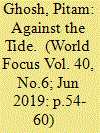

|
|
|
|
|
| Summary/Abstract |
For any state, the intricacies of its grand strategy impact its place in the global order. For those states that have the potential to become one of the world’s next superpowers, this strategy is the blueprint to achieve global dominance.
|
|
|
|
|
|
|
|
|
|
|
|
|
|
|
|
| 2 |
ID:
165710
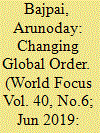

|
|
|
|
|
| Summary/Abstract |
The prevailing global order, based on the centrality of sovereign nation-states, was laid down during the peace of Westphalia in 1648. It has never been static and has witnessed many structural changes. The balance of power maintained by five-six European powers over two century gave way to bipolar structure following the World War II.
|
|
|
|
|
|
|
|
|
|
|
|
|
|
|
|
| 3 |
ID:
165708


|
|
|
|
|
| Summary/Abstract |
International political order has always been in flux. This has been the history of international relations since the dawn of colonialism and its eclipse. Colonialism was demarcated by the absolute ruthlessness of the colonisers towards the colonised. Colonialism impacted many countries leaving them dealing with issues that still smoulder. The wars of the last century revealed the use of the colonised as cannon fodder for conflicts that were essentially, between colonisers.
|
|
|
|
|
|
|
|
|
|
|
|
|
|
|
|
| 4 |
ID:
165703
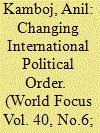

|
|
|
|
|
| Summary/Abstract |
Earlier, after the Second World War there were two super powers, United States and USSR, and the countries were divided into West Block or the East Block. Some countries wanted to remain as non-aligned. The global political order depended on which side that particular country wanted to lean. After the disintegration of USSR, the political order started changing. Russia started losing its domination and the vacuum thus created was being filled up by United States and other developed countries.
|
|
|
|
|
|
|
|
|
|
|
|
|
|
|
|
| 5 |
ID:
165714
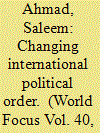

|
|
|
|
|
| Summary/Abstract |
A stable political order is a rare thing. When one power arises, it tends to come after a great upheaval that creates both the conditions and the desire for something new. It requires a stable distribution of power and broad acceptance of the rules that govern the conduct of international relations.
|
|
|
|
|
|
|
|
|
|
|
|
|
|
|
|
| 6 |
ID:
165706
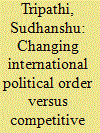

|
|
|
|
|
| Summary/Abstract |
There have been some prominent shifts in the world occurred in the recent past which are leading towards gradual unfolding of a new world order in the coming future. In fact, the election of Donald Trump as the 45th President of the US is being regarded as the watershed in the prevailing international order which indeed closed the era of moderate American diplomacy and interactions with the external world and instead led to emerge an aggressive bold championing of several global concerns like protection of human rights, democracy, environment, nuclear proliferation and trade imbalances etc. and that became visible in the US’ dealings with North Korea and China and even Russia too.
|
|
|
|
|
|
|
|
|
|
|
|
|
|
|
|
| 7 |
ID:
165720


|
|
|
|
|
| Summary/Abstract |
As the hub of global interaction, Central Asia is very crucial for the changing international political order. It is a large, landlocked region consisted of Kazakhstan, Uzbekistan, Kyrgyzstan, Tajikistan and Turkmenistan. It has been the hub of world’s most ancient civilizations for centuries, connecting Asia and Europe through the famous Silk road.
|
|
|
|
|
|
|
|
|
|
|
|
|
|
|
|
| 8 |
ID:
165722


|
|
|
|
|
| Summary/Abstract |
There have been significant socio-economic, political and cultural changes in the Asian and African continents in the last six decades. These changes were marked by certain challenges too and one such area of concern is related to growing violence, militarisation and increasing arms race among the nation-states.
|
|
|
|
|
|
|
|
|
|
|
|
|
|
|
|
| 9 |
ID:
165718


|
|
|
|
|
| Summary/Abstract |
Every century, invariably at one or the other juncture was engaged in discussing the International Political order as it mattered to the nation states at large. Though the Westphalian system assured of some sort of an order, the world failed to understand the very notion of order, which is a prerequisite for its very existence.
|
|
|
|
|
|
|
|
|
|
|
|
|
|
|
|
| 10 |
ID:
165705
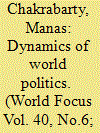

|
|
|
|
|
| Summary/Abstract |
The year 1991 marked the downfall of the Soviet Union in December and ushered into a period of radical shift of the world scenario from a bipolar world which was dominated by the United States of America and the U.S.S.R. for nearly half a century. The collapse of the Berlin wall in the year of 1989 and dissolution of the U.S.S.R. in the year of 1991, there was a radical change in world politics.
|
|
|
|
|
|
|
|
|
|
|
|
|
|
|
|
| 11 |
ID:
165713
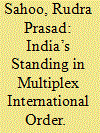

|
|
|
|
|
| Summary/Abstract |
International Order in the Post –Cold War phase mostly revolved around three major changes that the world has witnessed. First, US‘s failure to provide security in different regions and new form of threat has invited new form of global cooperation and interdependence. Second, it is observed that, the peaceful rise of China is coterminous with the shifting of global economic power from West to East direction.
|
|
|
|
|
|
|
|
|
|
|
|
|
|
|
|
| 12 |
ID:
165712


|
|
|
|
|
| Summary/Abstract |
The article on international political order summarizes the cooperation of different national and regional forces so as to represent the whole balance of efforts at different levels. It is a dispensation of new outlook, and understanding to catch the new narratives of international political order. The balance of international forces is taken into consideration for a harmonious international order.
|
|
|
|
|
|
|
|
|
|
|
|
|
|
|
|
| 13 |
ID:
165717


|
|
|
|
|
| Summary/Abstract |
India as an independent nation-state from mid-20th century created a niche for itself in international order by opting for an independent strategic foreign policy course known as nonalignment. With the end of Cold War the strategic position was replaced by a bourgeoning economy and India’s prominence was calculated on index of economic growth and prospect for an economic market.
|
|
|
|
|
|
|
|
|
|
|
|
|
|
|
|
| 14 |
ID:
165704


|
|
|
|
|
| Summary/Abstract |
Continuity and change is the core of alterations in international politics. Political systems have specific models to accommodate change . Authoritarian systems with a homogenous demography can adopt to change faster than democratic states with multi ethnic demography, multiple layers of social hierarchy and multi party systems. Technological innovations have facilitated change but political systems have adopted measures to suit their interest. Therefore ,decision making processes remain less altered compared to technological change. Economic interests have dominated at all levels of decision making local as well as global .
|
|
|
|
|
|
|
|
|
|
|
|
|
|
|
|
| 15 |
ID:
165715
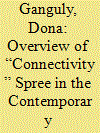

|
|
|
|
|
| Summary/Abstract |
The current international order has been marked by two trends essentially. The first is the resurgent right wing nationalism, ultra-nationalist populisms in countries like Russia, India, Turkey, Hungary, Egypt, Philippines, and now in the United States and in most of the cases leading to authoritarian rule. The Brexit vote and the rise of right wing parties in Europe also point to a similar trend in the global politics and the contemporary international order.
|
|
|
|
|
|
|
|
|
|
|
|
|
|
|
|
| 16 |
ID:
165709


|
|
|
|
|
| Summary/Abstract |
The old global liberal order which came in happening after the end of cold war era provided rich global liberal ambience, peace and stability to world order. It was not a by-product of accident rather it was designed in that way by the core states of northern hemisphere and Western Europe for security and economic reasons.
|
|
|
|
|
|
|
|
|
|
|
|
|
|
|
|
| 17 |
ID:
165716


|
|
|
|
|
| Summary/Abstract |
The twenty-first century world has been witnessing great structural transformation. The world at present is not the same as it was thirty years before. Rise and fall of superpowers, making and crumpling of alliances, changing contours of security, and restructuring of political, economic and cultural space of the world have left remarkable imprint on the way states have organized their relations worldwide.
|
|
|
|
|
|
|
|
|
|
|
|
|
|
|
|
| 18 |
ID:
165721


|
|
|
|
|
| Summary/Abstract |
The disintegration of Soviet Union in 1991 had amicable and significant strategic ramification for Asia. The end of the USSR removed the potential of a Soviet threat from the considerations of policy makers in China. The Rise of China is the greatest geographical event in the beginning of twenty first century.
|
|
|
|
|
|
|
|
|
|
|
|
|
|
|
|
| 19 |
ID:
165719


|
|
|
|
|
| Summary/Abstract |
Ensuing developments in the Post Cold-War period have fundamentally altered the structural design of international system and the way states redistributed their preferences and parameters of engagements. Russia’s changed global outlook and its relation with the former Soviet states was one of the important outcomes of this global transformation.
|
|
|
|
|
|
|
|
|
|
|
|
|
|
|
|
| 20 |
ID:
165707
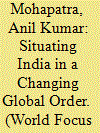

|
|
|
|
|
| Summary/Abstract |
The global order has not been a static phenomenon. In the tune of the laws of the nature it is too changing. From the Western-centric order it has entered a different phase having its manifestations in new political and economic structures. Morton Kaplan’s envisioning of six models of international system might have been based on that assumption. From a ‘Balance of Power’ system it changed to a ‘loose bi-polar system’ and now it appears to have been leading to a kind of not exactly but short of a ‘Unit Veto System’ where no state would venture to attack another as the states then will have equal potentialities to destroy each other.
|
|
|
|
|
|
|
|
|
|
|
|
|
|
|
|